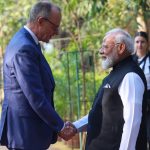Amid the unfolding African resurgence, India is set to deepen its multi-faceted engagement with Sub-Saharan Africa during External Affairs Minister Salman Khurshid’s first visit to the African continent.
The visit this week (April 17-19) will include a bilateral trip to Uganda and a meeting with heads of Indian missions of the region in the Ugandan capital Kampala. It takes place at a time when the Sub-Saharan Africa is emerging as a new growth pole in the world amid the global slowdown despite a host of crises in countries like Mali, the Central African Republic and the Democratic Republic of Congo.
On the bilateral track, it will be a time for stock-taking and appraisal of India’s key initiatives in Africa as New Delhi prepares to host the third India-Africa Forum Summit in the summer of 2014.
The visit to Uganda is significant in as much as the East African country, home to a large Indian diaspora, has morphed into an economic dynamo in the region, a trend that is bound to get accentuated with the discovery of massive oil reserves in that country. The talks in the Ugandan capital could set the stage for the visit of Ugandan President Yoweri Museveni to New Delhi later this year.
In an important outreach initiative, the foreign minister will also chair the meeting of 18 Indian heads of mission in Sub-Saharan Africa, the first time such an interactive meet will be held in the resource-rich region. The meeting will provide a platform to discuss and refine India’s positions on important flashpoints in the region like Mali and the CAR and will seek to generate inputs for fresh initiatives to bolster peace and development in the region. The envoys’ meeting is also expected to generate valuable inputs to fast-track the implementation of various projects pledged at the second India Africa Forum Summit in Addis Ababa and will set the stage for the 2014 New Delhi summit, official sources told India Writes in New Delhi.
In a pioneering initiative aimed at spurring the African resurgence through training and capacity building, India has pledged to set up around 100 training institutes across the continent at the two summits. By the next summit, India is hoping to have at least some of these institutes up and running.
Another important issue on the agenda will be India’s role in peace and security in the continent, an important focus area that was highlighted when five Indian peacekeepers were killed in South Sudan a few days ago, evoking much anguish and anxiety in India.
The security and strategic dimension of India’s ties with Africa are bound to get an added traction in days to come, with a heady cocktail of Islamist radicalism, politics and violence brewing in West Africa. What has fuelled worries in New Delhi about the volatile situation in Mali and West Africa is the reported connection of rebels with al-Qaeda-Taliban elements in Afghanistan. Against this backdrop, India has declared support for the UN-led initiative in Mali, the efforts of the Mali Stabilization Force and pledged $1 million at the donors’ conference in Brussels. India had also agreed to be part of the Support and Follow-Up Group (SFG) for Mali.
New Delhi sees peace and stability as prerequisites to the unfolding economic renaissance in Sub-Saharan Africa, home to some of the fastest-growing economies in the world and an emerging good news story of enterprise and resilience amid the global slowdown.
The resurgent African continent is generating a wave of Afro-optimism across the world, with the continent expected to clock the growth rate of 6 per cent this year. India and Africa, with a combined gross domestic product of nearly $3 trillion and healthy growth rates, are rapidly emerging a bulwark against the corroding downturn. Building upon a new business alchemy, bilateral trade between the two sides have exceeded $60 billion. The two sides have set an ambitious target of scaling it to $100 billion by 2015.
The economic ties have been complemented by a surge in people-to-people initiatives. Last month, the 9th edition of India-Africa business conclave was held in the Indian capital, which brought over 600 delegates and officials from 41 African countries in quest of business deals which are estimated to be around $60-80 billion.
In March, around 40 African parliamentarians visited India and had wide-ranging interactions across the spectrum with the leadership as well as civil society. The ongoing democratisation of Africa has opened up new possibilities for India to expand its diplomatic and economic footprints in the continent.
Manish Chand is Editor-in-Chief of India Writes, www.indiawrites.org and Editor of Two Billion Dreams: Celebrating India-Africa Friendship)
Author Profile

- Manish Chand is Founder and Editor-in-Chief of India Writes Network (www.indiawrites.org) and India and World, a pioneering magazine focused on international affairs. He is CEO, Centre for Global India Insights, an India-based think tank focused on global affairs.
Latest entries
 India and the WorldFebruary 7, 2026Modi hails interim India-US trade deal, Goyal says no concessions made on agriculture
India and the WorldFebruary 7, 2026Modi hails interim India-US trade deal, Goyal says no concessions made on agriculture India and the WorldFebruary 2, 2026Trump announces trade deal with India, Modi ‘delighted’
India and the WorldFebruary 2, 2026Trump announces trade deal with India, Modi ‘delighted’ India and the WorldJanuary 31, 2026Palestinian minister bats for mediatory role for India in ending Gaza conflict
India and the WorldJanuary 31, 2026Palestinian minister bats for mediatory role for India in ending Gaza conflict India and the WorldJanuary 13, 2026India, Germany raise the bar for defence, economic ties
India and the WorldJanuary 13, 2026India, Germany raise the bar for defence, economic ties







